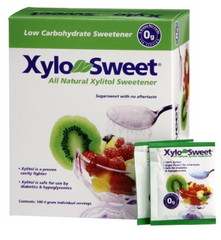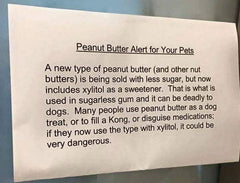Sweet but not so sweet for dogs
Have you heard of Xylitol?
In our age of low sugar and no sugar, new alternatives to sugar have popped up all over the place! As one of them, Xylitol is dangerous to dogs, I thought it was time to highlight it. Particularly when it is used as an additive. Although Xylitol is not a new product it has been recently embraced in the food sectors in NZ along with other countries and is being included in many foods.
The Dangers
While Xylitol is relatively safe to all other species it is highly poisonous to dogs. Canines are the only species where it is toxic and can be fatal.
We generally know that chocolate is poisonous to dogs but did you know that Xylitol is 100 times more toxic than chocolate?
Being an additive it MUST be disclosed on the labels according to Australian and New Zealand labeling requirements. The chemical number of Xylitol is 967 – one to remember as often additives are listed as numbers as opposed to the name.
Harmful levels can vary. Some dogs may have a short-term intolerance to it, but in general it only takes 100 milligrams per kilogram of body weight to cause hypoglycemia (where blood sugars drop). 500 milligrams per kilogram of body weight can attack the liver and can be fatal.
Symptoms of Xylitol poisoning come on rapidly – usually 15-30 minutes after ingestion: symptoms can be Vomiting, Weakness, Lack of coordination or difficulty walking or standing, Lethargy, Seizures, Coma.
If you suspect Xylitol poisoning please contact your vet immediately as inducing vomiting only removes it from the stomach and your dog may already be hypoglycemic which can cause liver failure.
Get your dog to the emergency vet immediately if you suspect Xylitol poisoning.
So what Is it and where does it come from?

XYLITOL – in ancient Greek means XYL (wood) and ITOL (denotes sugar alcohols). Xylitol is a polyalcohol or a sugar alcohol, a sweetener that has a lower glycemic index than sugar. It comes in the form of a powder that can be added to many products.
Xylitol was discovered in Finland by breaking down the 5-carbon sugar and was widely used in Scandinavia from the Second World War on due to the sugar shortage.
Xylitol is naturally found in the bark of Birch trees and some vegetables, primarily corncobs.
Although it can be derived from bark it is most commonly derived from corncobs. It then goes through a hydrogenation process to make it commercially viable or shelf stable.
From there it is added to food and drinks to sweeten them.
Some products known to contain Xylitol:
- Toothpastes
- Tooth gels
- Dental floss
- Chewing gums and mints
- Sweets and candies
- Baked goods
- Drinks
- Peanut Butters
Peanut Butters are the main concerns for us dog owners as many of us fill Kongs with peanut butter as a long lasting treat.
In addition though, mints and chewing gums can be left lying around and if you’re like me, and share a bit of your baked goods with your dog, then this could be dangerous too.
Peanut Butters
I’ve only seen American brands of Peanut Butter that contain Xylitol and I am unsure if these brands are in New Zealand:
- Go Nuts Co
- Krush Nutrition
- Nuts n More
- P28
I contacted two popular peanut butter brands in New Zealand to ask them:
- Do any of your products contain xylitol, are you planning on ever putting this additive in your Peanut Butters?
So that's great news!
If you stick with the New Zealand brands like the two above then you can continue to give your dog treats with peanut butter knowing you are not poisoning them. Both these brands are are free from additives and other nasties too.
Baked items:

Xylitol is also bought in the form of a powder to add to baking as a sugar replacement. If you use this sugar substitute then make sure your dog never gets a piece of your baked goods. Unfortunately there was a case in New Zealand in 2016 where a dog swiped a baked item off the counter, by the time the owners realised, hypoglycemia had already started, they did everything they could to save their dog but unfortunately it was too late.
So what do you need to do now?
- Take care with what you are feeding your dogs. Always know the ingredients.
- Always read the labels.
- Always ask if your bought baked goods contain Xylitol- or better still if you do not know then don’t share any of these with your dogs.
- And if your dog is crafty then please ensure you store any of the items mentioned above, up high, in a cupboard and out of reach, away from your dog.
- Share this blog with your dog friends -lets make sure everyone knows of this danger.
Had you heard of Xylitol before?
Did you know Xylitol could be fatal to dogs?





Thanks Johanna – that’s good advice re falling on the floor too – Thank you
Even though I like xylitol, I refuse to have it in the house. I have kids, and it’s easy for food to fall on the floor. Dogs can die very quickly from ingesting it. It can be 15 minutes or less.😰😰😰
Leave a comment